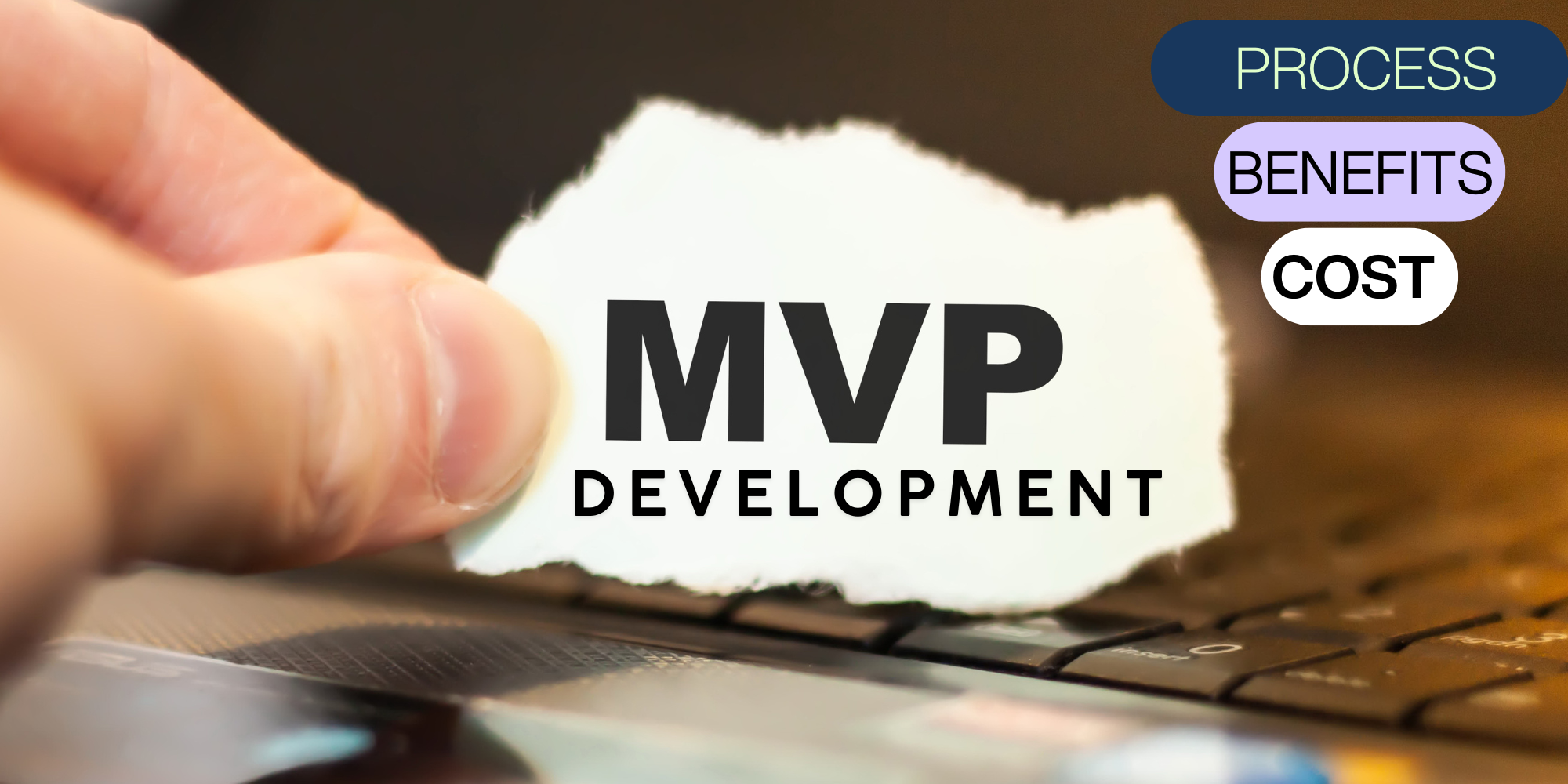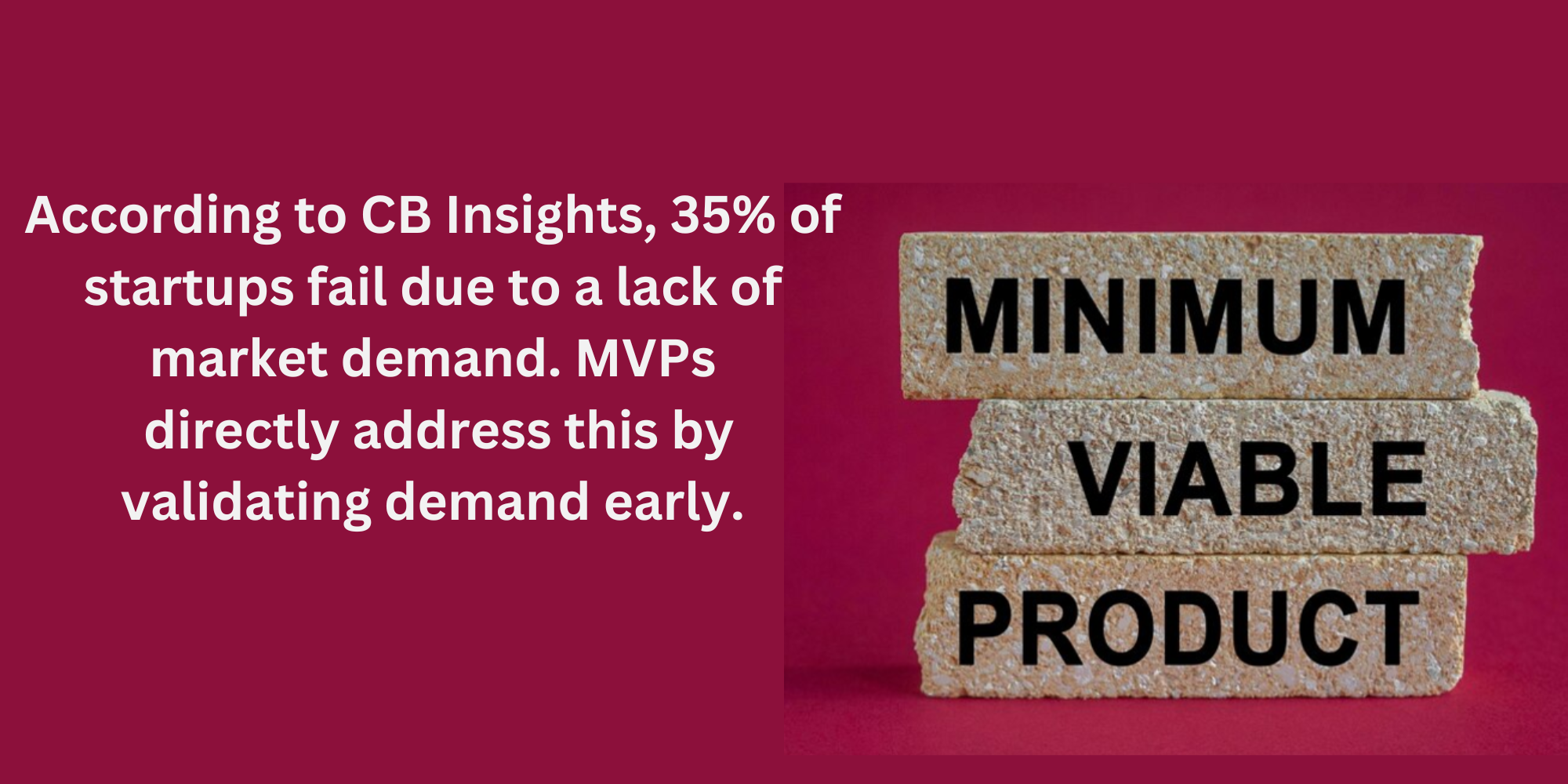
INTRODUCTION
In today’s competitive landscape, launching a successful startup requires more than just a great idea—it demands validation, adaptability, and speed. This is where Minimum Viable Product (MVP) development plays a pivotal role. An MVP is a stripped-down version of a product with just enough core functionality to attract early adopters, test the market, and gather actionable feedback. It allows startups to validate their ideas quickly and efficiently before investing significant time and resources into full-scale development.
This approach aligns perfectly with the lean startup methodology, emphasizing iteration, user feedback, and efficient resource allocation. For startups navigating uncertainty, MVP development minimizes risks and maximizes learning opportunities.
This article delves into the process, benefits, and cost considerations of MVP development, offering a comprehensive guide for entrepreneurs and innovators looking to bring their ideas to life effectively.
What is MVP Development?
MVP development refers to the process of creating a product with the most essential features required to solve a specific problem for a target audience. It’s not about delivering a bare-bones product; instead, it’s about crafting a version that captures the essence of your solution, offering enough value to attract early adopters while paving the way for continuous improvement.
Key Characteristics of an MVP:
Core Functionality: Delivers the primary value proposition without the frills.
Real User Feedback: Provides insights into user needs and behavior.
Scalable Foundation: Acts as a launchpad for future iterations and growth.
Example in Action:
Consider Airbnb’s MVP, which started as a simple website listing a few apartments during a conference in San Francisco. It wasn’t polished or feature-rich, but it validated a crucial market need: people wanted affordable, short-term accommodations. Today, Airbnb is a household name.

The Critical Role of MVPs for Startups
1. Mitigating Risk in a High-Failure Environment
Startups often operate under tight budgets and pressing timelines, leaving little room for error. An MVP minimizes risk by:
- Testing Assumptions Early: Validate whether your solution solves a real problem.
- Avoiding Overinvestment: Save resources by focusing only on essential features initially.
2. Accelerating Time-to-Market
Speed is critical in today’s competitive landscape. MVP development ensures you enter the market quickly, capturing early adopters while refining your product based on real feedback.
3. Aligning with Customer Needs
Building a full-scale product without user input can lead to wasted effort. MVPs foster a feedback loop, enabling startups to develop customer-centric solutions that evolve in alignment with actual needs.
4. Building Investor Confidence
A well-executed MVP demonstrates your startup’s viability, making it easier to attract funding. Investors are more likely to back a validated idea supported by user data than an untested concept.
5. Resource Optimization
Developing an MVP allows startups to allocate their limited resources wisely. Instead of spreading your team thin across numerous features, MVPs ensure focus and efficiency.
Here are some statistics about MVP development for startups:
Success rate: According to Harvard Business Review, startups that prioritize MVP development have a 70% success rate.
Failure rate: According to CB Insights, 42% of startups fail due to a lack of market need.
Cost: The average cost to develop an MVP is between $10,000 and $50,000. The exact cost depends on the features, technology stack, and level of customization.
Process of MVP Development: How We Help Startups Turn Ideas into Reality
At [AppOctet Technologies], we understand that launching a successful product starts with validating your idea efficiently. Our MVP (Minimum Viable Product) development process is tailored to help startups like yours bring their vision to life while minimizing risks and maximizing value. Here’s how we work with you to create a robust MVP:
1. Initial Consultation: Understanding Your Vision
We begin by learning about your business idea, target audience, and goals. This helps us align our expertise with your vision.
- What We Do:
- Conduct in-depth discussions to understand the problem you’re solving.
- Define success metrics and key objectives for the MVP.
- Identify challenges and constraints, such as time or budget.
- What You Get:
A clear roadmap outlining your idea, business goals, and how the MVP will address them.
2. Market Research and Competitor Analysis
Before we start building, we help validate your idea by analyzing the market and your competition.
- What We Do:
- Conduct research on your target audience and industry trends.
- Study your competitors to identify opportunities and differentiators.
- Validate assumptions through data-backed insights.
- What You Get:
Actionable insights that refine your MVP concept and identify the core features needed to stand out.
3. Feature Prioritization and Scope Definition
Together, we decide which features are essential for the MVP and focus on delivering maximum value.
- What We Do:
- Facilitate workshops to brainstorm and prioritize features.
- Use frameworks like Moscow (Must Have, Should Have, Could Have, Won’t Have) to determine the scope.
- Create a feature list focused on solving the most critical user problems.
- What You Get:
A well-defined feature set and a clear understanding of the MVP’s scope.
4. Prototyping and UX/UI Design
We design the product’s interface to ensure it’s intuitive, engaging, and user-friendly.
- What We Do:
- Create wireframes and user flow diagrams to map the customer journey.
- Develop high-fidelity prototypes to showcase the look and feel of the product.
- Test designs with a small group of users to gather feedback.
- What You Get:
Interactive prototypes that bring your vision to life and validate the user experience.
5. Technology Stack Selection and Planning
Choosing the right technology is key to building a scalable and reliable MVP.
- What We Do:
- Recommend a technology stack based on your requirements and budget.
- Plan development milestones using Agile or Scrum methodologies for flexibility.
- Set up a robust project timeline to ensure timely delivery.
- What You Get:
A detailed development plan and the confidence that your MVP will be built using the best tools for your needs.
6. MVP Development
Our development team brings your MVP to life with a focus on quality and efficiency.
- What We Do:
- Build the core features, ensuring functionality, security, and scalability.
- Conduct internal reviews at every milestone to maintain quality.
- Keep you updated on progress through regular check-ins and demo sessions.
- What You Get:
A fully functional MVP ready to be tested by real users.
7. Testing and Quality Assurance
Before launch, we rigorously test your MVP to ensure it’s ready for users.
- What We Do:
- Perform usability, performance, and compatibility testing.
- Fix bugs and refine features based on testing results.
- Ensure the product meets your requirements and is user-ready.
- What You Get:
A stable MVP free from critical issues and ready for deployment.
8. Launch and Feedback Collection
We help you launch your MVP to early adopters and gather feedback for improvement.
- What We Do:
- Deploy the MVP on the platform of your choice (web, mobile, or both).
- Integrate analytics tools to track user behavior and engagement.
- Collect feedback from users through surveys and interactions.
- What You Get:
Valuable insights into user preferences and how your product is performing.
9. Iteration and Refinement
Using the feedback collected, we help you improve and enhance your product.
- What We Do:
- Analyze feedback to identify areas for improvement.
- Implement updates and add new features as needed.
- Prepare the product for scaling or full development.
- What You Get:
An improved version of your MVP, fine-tuned to meet user expectations.
10. Planning for Growth
Once your MVP is validated, we work with you to plan the next steps.
- What We Do:
- Develop a roadmap for scaling the product and adding advanced features.
- Provide long-term technical support to ensure smooth operation.
- Explore strategies for market expansion and funding opportunities.
- What You Get:
A scalable product and a partner ready to support your journey to full-scale success.
Why Choose Us?
At [AppOctet Technologies], we see ourselves as partners in your success. From idea to execution, we’re here to provide technical expertise, creative solutions, and dedicated support to help your startup thrive.
As a non-technical founder, navigating technology investments and understanding market demands can be daunting. You need a partner who not only grasps your vision but also guides you toward success by aligning with your business goals. At AppOctet Technologies, we specialize in product development with a deep focus on understanding your vision. We conduct extensive ground-level research before initiating development, laying a solid foundation for your startup’s success.
Our approach has proven impactful for every company we’ve collaborated with. A prime example is our recent success with Party Culture, where we powered Playace’s House Party Revolution. Post-launch, the platform achieved a 300% growth and reduced operational costs by 70%. In just 7 weeks, we solved challenges that had persisted for 7 years, delivering transformative results.
At AppOctet, we don’t just build products—we create solutions that drive measurable impact and long-term growth.
Read the full case study here https://www.appoctet.com/case-study/entertainment/playace/index.html
Let’s collaborate to turn your vision into a product that users love.
Cost of MVP Development: A Comprehensive Breakdown
One of the most critical questions for startups considering an MVP is, “How much will it cost?” The answer depends on several factors, including the project’s complexity, the technology stack, and the location and size of the development team. Let’s break down these factors to help you better understand the investment required.
Factors Influencing MVP Development Costs
1. Project Complexity
The complexity of your product directly impacts the time, effort, and cost involved in development.
- Simple MVPs: Focus on basic functionality and straightforward user flows, such as a single-purpose mobile app or a basic e-commerce platform.
- Example: A to-do list app with basic features.
- Estimated Cost: $10,000–$25,000
- Moderate Complexity MVPs: Include multiple features, integrations with third-party services, or intermediate-level backend requirements.
- Example: A ride-sharing app with user and driver interfaces, GPS tracking, and basic payment processing.
- Estimated Cost: $25,000–$50,000
- High Complexity MVPs: Require advanced functionality, custom algorithms, or complex backend architecture. Examples include AI-driven platforms or fintech solutions.
- Example: A SaaS platform with analytics, data visualization, and real-time syncing.
- Estimated Cost: $50,000–$150,000 or more.
2. Technology Stack
The tools and technologies used for development significantly influence costs. Some tech stacks are faster and more cost-effective, while others require specialized expertise.
- Front-End Development:
Common tools: React.js, Vue.js, or Angular. React.js is often preferred for speed and scalability.
- Back-End Development:
Common frameworks: Node.js, Django, Ruby on Rails. Frameworks like Node.js are efficient for scalable, real-time apps.
- Mobile Platforms:
- Native Apps: Separate development for iOS (Swift) and Android (Kotlin/Java). Higher cost.
- Cross-Platform: Tools like Flutter or React Native allow simultaneous development, reducing costs.
- Database and Hosting:
Cloud platforms like AWS, Firebase, or Azure offer scalable hosting solutions, with costs varying based on usage.
3. Development Team Size and Structure
Your team’s composition affects costs, especially if you need specialized roles like UX designers or DevOps engineers.
- Small Team (Freelancers):
Includes 1–2 developers and possibly a designer. Suitable for simple projects.
- Cost: $20–$50/hour, depending on location.
- Mid-Sized Team (Agency or Dedicated Developers):
Includes front-end, back-end, UX/UI designers, and a project manager. Suitable for moderately complex MVPs.
- Large Team (Enterprise-Level):
Includes specialized roles like QA testers, DevOps, and business analysts. Suitable for complex MVPs.
4. Development Team Location
Location significantly impacts hourly rates for developers.
| Region | Hourly Rate |
| North America | $100–$200/hour |
| Western Europe | $80–$150/hour |
| Eastern Europe | $30–$70/hour |
| South Asia (e.g., India) | $20–$50/hour |
| Southeast Asia | $25–$60/hour |
General Cost Ranges for MVP Development
Here’s an estimate of MVP development costs based on the factors above:
| MVP Type | Estimated Cost Range | Time to Build |
| Basic MVP | $10,000–$25,000 | 2–3 months |
| Moderate Complexity MVP | $25,000–$50,000 | 3–6 months |
| High Complexity MVP | $50,000–$150,000+ | 6–12 months or more |
Key Considerations to Optimize Costs
- Start Simple: Begin with a lean MVP that focuses on core functionality and add features incrementally.
- Leverage Cross-Platform Tools: Use frameworks like Flutter or React Native to save time and money for mobile apps.
- Outsource Smartly: Partner with skilled teams in cost-effective regions like Eastern Europe or Asia.
- Use Agile Development: Agile methodologies allow you to adapt quickly to feedback, reducing unnecessary expenses.

Struggling to validate your startup idea without burning through funds?
For startups navigating the volatile waters of innovation, failure is a daunting reality—90% of startups fail, often due to misaligned products, insufficient resources, or inadequate market validation. Accessing business loans can provide the necessary financial cushion to support early-stage development. By focusing on building a functional yet simplified version of your product, MVPs allow startups to test their ideas in the real world with minimal risk and maximum impact.
Why Every Startup Needs an MVP
Imagine launching a full-scale product that takes a year to develop, only to discover it doesn’t resonate with users. MVP development eliminates this nightmare scenario by allowing startups to learn, adapt, and scale effectively. For startups facing resource constraints and high stakes, MVPs are more than a development strategy—they’re a survival mechanism.
Ready to validate your big idea without breaking the bank? Let’s discuss how an MVP can transform your startup journey. Reach out to our team today! Dive into our website https://www.appoctet.com/
Why MVP Development is Crucial for Startups
- Rapid Validation of Business Ideas: MVPs help determine whether there’s a real demand for your product before investing heavily in development.
- Cost Efficiency: By focusing on essential features, startups can avoid overspending on unnecessary functionalities.
- Risk Mitigation: Early user feedback helps identify potential issues, ensuring the final product is better aligned with user needs.
- Faster Time-to-Market: Launching a basic version quickly gives startups a competitive edge by entering the market sooner.
- Foundation for Iteration: MVPs act as the starting point for continuous improvement and scaling.
Whether you’re building a mobile app, web platform, or software solution, understanding the nuances of MVP development can set your startup on the path to success. To know our work read our latest case studies https://www.appoctet.com/#case-study
How MVP Development Solves Common Startup Challenges
- “I’m not sure if there’s demand for my product.”
An MVP validates your idea by putting it in front of real users.
- “I don’t have enough resources to build a complete product.”
MVPs focus on core features, making them more affordable to develop.
- “What if I build something people don’t want?”
By gathering user feedback early, you can refine your product to align with market needs.
- “How do I attract investors?”
A successful MVP proves that your concept works, boosting investor confidence.
The Bottom Line
MVP development is not just a development methodology; it’s a mindset that prioritizes efficiency, user feedback, and market validation. For startups navigating uncertainty and resource constraints, it’s a powerful way to turn an idea into a scalable solution.
Are you ready to take your startup idea to the next level? Start with an MVP and build your success story!
CONCLUSION
Building a startup is a journey filled with uncertainties, and developing a Minimum Viable Product (MVP) is one of the smartest ways to navigate these challenges. By focusing on creating a product with core features, startups can validate their ideas, engage with real users, and gather valuable insights to guide their next steps.
Why MVP is a Strategic Asset
The MVP process isn’t just about creating a functional product—it’s about setting the stage for long-term success. By validating your idea early, you gain clarity on your market fit, build trust with users, and create a solid foundation for future iterations.
In today’s fast-paced and competitive market, speed, adaptability, and user engagement are key differentiators. MVP development allows startups to embody these qualities, enabling them to pivot when necessary, capitalize on feedback, and scale effectively.
For startups, an MVP is not merely a steppingstone; it’s a mindset—a commitment to learning, improving, and delivering value. By adopting an MVP-first approach, startups position themselves to minimize risks, attract early adopters, and secure their place in the market. Whether you’re a budding entrepreneur or an established founder exploring new ideas, the MVP strategy is your gateway to sustainable and impactful growth.